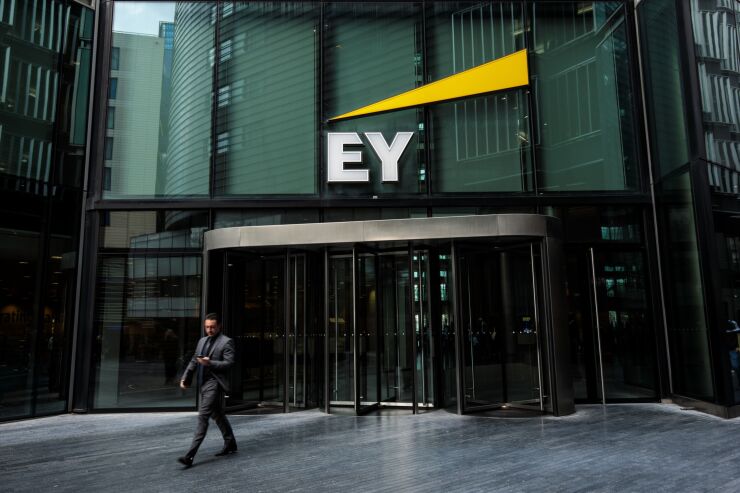When partnerships decide to sell their firms into the public markets through an initial public offering, it’s always about the money — even if it isn’t only about the money.
Big Four auditor Ernst & Young LLP’s potential IPO of its consulting activities could trigger stock windfalls of as much as $8 million each for the consulting partners, according to the Financial Times. Even the partners in the audit firm left behind could get payouts too — averaging about $2 million each, the Wall Street Journal reported.
These numbers reflect the fact that the consulting practice is in large part being handed to its current partners but the audit partners need to approve the deal.

Assuming the split goes ahead, most of the consulting activities (including strategy, deal and tax advice) would cease to belong to distinct national partnerships and become a company whose equity was divided among newly established shareholders, most of whom would be the current partners on the consultancy side. In time, they could cash in their stock.
The rump businesses — which date back to the early 20th century — would focus on audit activities and retain the current partnership structure. Ownership would therefore continue to pass down through successive generations of partners, each sharing the annual profits as equity holders while they worked at the firm.
Of course, there are good business reasons for EY to consider a full separation of its audit and consulting practices. Each side would then be free of the potential conflicts of interest that irk regulators when the two sit under one umbrella, so they could operate more freely. Strategically, it makes sense.
But the financial attractions of going public must also exceed the downsides for the partners — disclosure requirements and the loss of the undiluted participation in profits through a partnership. So a lot of stars need to align. Notably, management consultant McKinsey & Co. hasn’t gone public. Perhaps its partners make enough money already without having to cash in the firm.
An EY split creates the challenge of how to share the consultancy equity between the current top echelons.
The newly independent company could have an enterprise value nudging $100 billion. That’s assuming revenue grows from a reported 2022 forecast of $26 billion and margins are at least as good as those of listed peer Accenture Plc, supporting a premium valuation.
The non-audit activities don’t have a very long history and the current consulting partners could argue that the bulk of the value creation has taken place over their careers, and so belongs to them. But consulting has benefited from the audit arm’s financial resources, brand and client relationships. An unknown startup consulting firm would not have grown so rapidly without these assets. The audit business is owed a return regardless of the fact the audit partners need incentivizing to vote for a split.
That requires cash to be found. An IPO could raise $10 billion in a sale of 15% of the business, plus $17 billion of debt, according to the Wall Street Journal. (A small portion of these proceeds would probably need to be retained by the listed consulting business.)
On a purist view, the retired partners deserve something too. They helped build this business too and it would be galling for them to watch their successors clean up. The snag is that they have no concrete leverage to extract a payout. They do have soft power. Alumni networks can help provide new business and can influence a firm’s reputation. Giving retired partners some token equity would make some commercial sense. Whether that’s feasible in such a big firm is another matter.
Then there’s EY staff just below partner level. They may feel robbed of the chance to enter the existing partnership. Even if the “partner” title endures, the conventional partnership economics won’t. EY may keep back 15% of the equity to serve as incentive awards for non-partners, according to the WSJ. Whether that’s enough remains to be seen.
A listed EY consulting arm will have to share its profits with outside investors, meaning there’s less to pay the employees. The temptation of joining or starting a rival partnership will be heightened if pay is cut to fund dividends.
Of course, the same issues have confronted other former partnerships that have dissolved ahead of IPOs or stake sales — think of Goldman Sachs Group Inc. in the U.S. and Cazenove in the U.K. There’s always one fortunate generation for whom everything comes together.
Unfortunately, it’s often just tough luck for those who preceded them, and those who hoped to follow.